Disclosure: Privacy Australia is community-supported. We may earn a commission when you buy a VPN through one of our links. Learn more.
The 8 Best Online Courses Providers in Australia
If I were to Google ‘online learning’ right now, I’d find many sites offering online courses. But how would I know the difference between good and not-so-good? When learning a new skill and gaining knowledge, I want to know that I’m getting all of that from a reputable provider.
To make everything much clearer, I’ve reviewed the best online course providers in Australia. I’ve broken down the pros and cons and given my honest opinion about each one. In the end, the choice will be much easier.
TL;DR
- Coursera offers university-level courses and degrees from top institutions.
- FutureLearn specialises in short courses and microcredentials.
- Udacity focuses on tech skills with “Nanodegree” programs.
- Codecademy provides interactive coding courses for beginners to advanced.
- HubSpot Academy offers free marketing, sales and service courses.
- LinkedIn Learning has a vast library of professional development courses.
- edX partners with universities for MOOCs and online degrees.
- Udemy is a marketplace for affordable courses on almost any topic.
Criteria Breakdown Summary
When evaluating these online learning platforms, I looked at a few key factors. I looked at online course variety and assessed whether the platform offers a good range of subjects. Some online courses are more specialised, and I explored that aspect too. I also looked at whether the courses are taught by experts and academics along with platform usability. Of course, value for money is important too, so I checked whether platforms are worth the price or not. Finally, I assessed certification options.
1. Coursera
Best Known for University Partnerships
Coursera is a popular online courses provider with cost-effective learning opportunities. They have partnered with some of the top universities and organisations in the world to create quality courses, including full degrees. I particularly like how easy it is to study a course online with this platform and the range of subjects available.
There are some free courses but to achieve certification, there are costs involved. Some courses also have set start dates, so that’s something to be aware of.
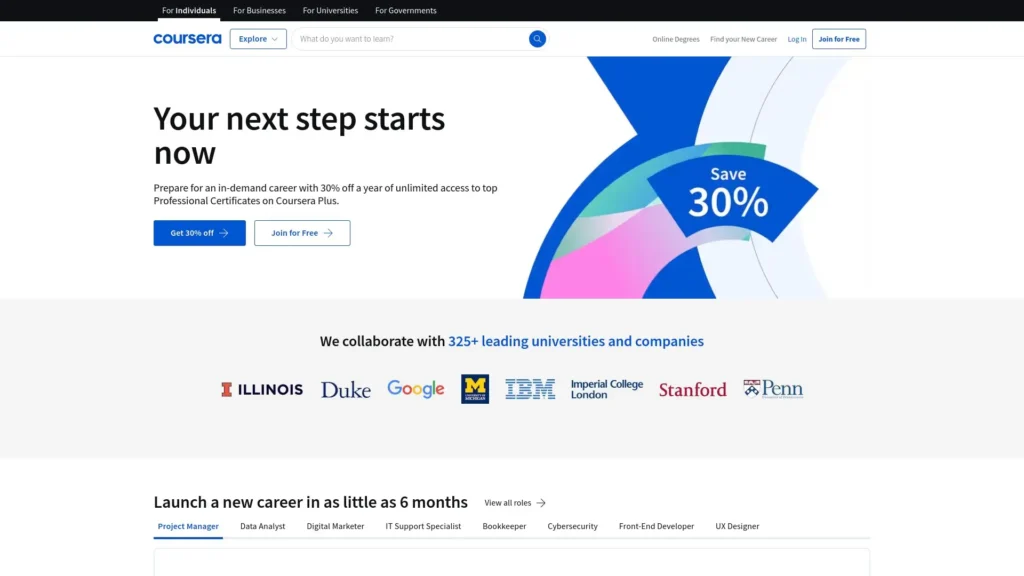
Coursera offers some of the best online courses and collaborates with many leading companies and universities.
Features
• Courses from 200+ leading universities and companies
• Options for individual courses and specialisations, including full degrees
• Certificates shareable on LinkedIn
• Financial aid available for those who qualify
• Mobile app for learning on the go
Pros
- High-quality, university-level courses
- Wide range of subjects available
- Option to audit many courses for free
- Accredited degrees and professional certificates
Cons
- Some courses have fixed start dates
- Full specialisations can be pricey
- Limited interaction with instructors in most courses
Criteria Evaluation
Course Variety: 5/5
Instructor Quality: 5/5
Platform Usability: 4/5
Value for Money: 4/5
Certification Options: 5/5
Community Reviews and Expert Recommendations
Community reviews for Coursera are a mixed bag. Let’s take a look at what some users say:
“I will always be grateful to Coursera. It changed my life in many ways. To date, I have completed 37 courses, the last one was June 2023. I’m surprised to see the negative reviews here. Indeed, I am still a proud Coursera learner since 2012.” – Nelson Guillen via Trustpilot
“I tried several e-learning platforms, but have liked Coursera the most so far, not only for their content but also their interface. I have been a customer now for 2 years and overall feel I have learned a fair amount thanks to the platform. However, one year I had a discounted offer, but they didn’t honour that. Also you have to pay for many courses after subscribing which I feel there should be more transparency over.” – Peter via Trustpilot
Industry experts praise the number of courses available and the collaboration with leading universities and companies. They also say pricing is competitive.
Pricing
Coursera offers a range of pricing options:
• Many courses can be audited for free
• Individual course certificates typically cost $49-$99
• Specialisations and professional certificates start around $39-$79 per month
• Full degrees range from $9,000 to $45,000
2. FutureLearn
Best Known for Short Courses and Microcredentials
FutureLearn is a quality online training platform offering many courses. The Open University, which is based in the UK, founded it. I like the fact that this platform offers short courses that are extremely engaging. I tried several and found them very interesting, without losing my attention halfway through. The courses are also designed to be usable in everyday life and work.
I also really enjoyed the social learning approach this platform uses. It encourages you to collaborate and discuss learnings with other participants. Overall, I found it helped me connect with likeminded people and enhanced my knowledge.
FutureLearn offers a mix of paid and free courses, and it’s possible to pay for an upgrade for certificates. The only downside is that while many courses are on offer, there are other online training platforms that have a greater selection.

FutureLearn offers some of the best online courses in the UK.
Features
• Courses from top universities and cultural institutions
• Social learning approach with peer discussions
• Microcredentials for career advancement
• Flexible deadlines for most courses
• Option to upgrade for certificates and extended access
Pros
- Engaging, bite-sized learning modules
- Strong emphasis on peer interaction and discussion
- Courses from reputable institutions worldwide
- Flexible learning options with free course access
Cons
- Smaller course catalogue compared to some competitors
- Limited free access to course materials after course ends
- Fewer tech-focused courses than some other platforms
Criteria Evaluation
Course Variety: 4/5
Instructor Quality: 4/5
Platform Usability: 5/5
Value for Money: 4/5
Certification Options: 4/5
Community Reviews and Expert Recommendations
Looking at community reviews, FutureLearn has a great mix of positive and mid-level replies. Most praise its ease of use and social learning approach. However, some learners are concerned about the price of certificates.
“It was a great opportunity to take a course at FutureLearn. I’m so happy I had a chance and I recommend everyone to take a course at FutureLearn. What made it a great one was the videos attached to the course to broaden the understanding, quizzes, in all everything was on point. The only problem was to pay for my certificate after I was done learning which was not started initially” – Zaharatu Adam Suraka via Trustpilot
“FutureLearn is an amazing educational provider. The experts and intellectual presenters are brilliant. The contents are well structured and meticulous. Learners with any learning style could follow sessions with ease.” – Fiona Rodrigo via Trustpilot
Industry experts agree that FutureLearn is a quality online course provider and particularly rate its association with the Open University. However, they also agree that the catalogue of courses could be larger.
Pricing
FutureLearn’s pricing structure includes:
• Many courses are free to audit
• Upgrades for certificates and extended access start at around $39-$99
• Microcredentials range from $600-$1400
• FutureLearn Unlimited subscription is $279.99 per year
3. Udacity
Best Known for Tech-Focused Nanodegree Programs
I particularly rate Udacity for technology courses, and these are also high level. This online course provider has partnered with some of the biggest tech names, including Google, IBM, and Amazon. They offer “nanodegree” courses which are similar to mini degrees but focused on practical job-based skills.
With courses on data science, AI, cloud computing, and programming and developing, there is plenty to choose from. I found these courses more complicated than some other providers, but that is also down to the subject at hand. Another plus point that I enjoyed is the tutor feedback; it helped me understand where I needed to focus my attention more.
There is a downside, and that’s the cost. However, it’s important to remember that an online course could lead to a very rewarding career. Some courses also come with a job guarantee within six months of graduation, called the Nanodegree Plus program.
However, I wouldn’t recommend Udacity for anyone who doesn’t want to focus on technology subjects. It does have a slim subject niche, but it’s a powerful one.
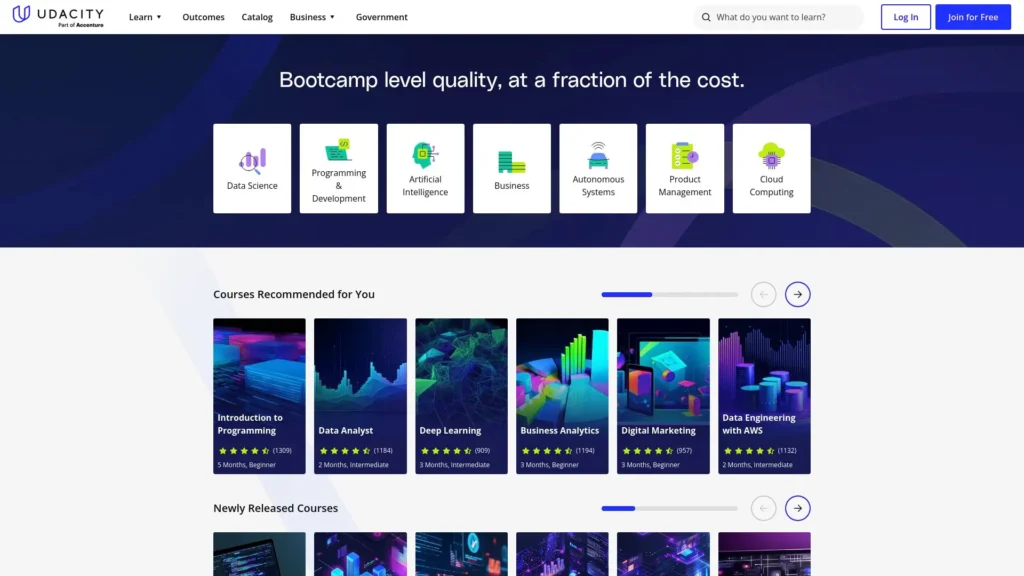
Udacity works with some of the world’s largest tech companies and offers some of the greatest online courses.
Features
• Nanodegree programs co-created with industry leaders
• Real-world projects with personalised tutor feedback
• Technical mentor support
• Career services including resume support and LinkedIn profile optimisation
• Job guarantee via the Nanodegree Plus program.
Pros
- Cutting-edge curriculum in tech and data science
- Strong industry partnerships and recognition
- Hands-on, project-based learning
- Comprehensive career support services
Cons
- Higher price point compared to many platforms
- Limited course options outside of tech fields
- Can be very time-intensive and challenging
Criteria Evaluation
Course Variety: 3/5 (focused on tech)
Instructor Quality: 5/5
Platform Usability: 4/5
Value for Money: 4/5
Certification Options: 5/5
Community Reviews and Expert Recommendations
Overall, Udacity enjoys positive feedback from community reviews. Most users particularly rate the subject niche, as it typically attracts learners who want to focus on technology. While the price point remains a contentious point, most see the value.
“It is a very good experience. The lessons are interesting, and I find that the exercises and quizzes that follow each lesson help me connect with the material.” – Yorda Code via Trustpilot
“Udacity programs are carefully created with the top industry needs in mind. Their programs are challenging but It is what shaped me and gave me confidence that I have the capacity I need to be a good data analyst.” – Joanna Umuganwa via Trustpilot
Industry experts agree that Udacity is a great option for learners interested in tech. They appreciate that the courses are more complex because they must be. However, they agree that the prices are quite high.
Pricing
Udacity’s pricing structure looks like this:
• Nanodegree programs typically range from $399 to $1999
• Pay-as-you-go monthly options available, usually around $399 per month
• Occasional discounts and scholarships offered
4. Codecademy
Best Known for Interactive Coding Courses
Code has always seemed complicated to me, so I wasn’t relishing the idea of trying Codecademy. However, I found their online courses to be very easy to follow, and they simplified a subject that many struggle with. In many ways, they’ve always made it enjoyable.
This online course provider has a very interactive platform and they’ve gamified the entire subject. This helped me stay focused, and even from the start, I was writing real code.
Another advantage of Codecademy is that different languages are offered, including JavaScript and Python. All this is free, but there are additional fees for additional features and certificates with the Pro account.
I recommend Codecademy for learning the basics of code. However, anyone aiming for a senior position will probably need additional training.
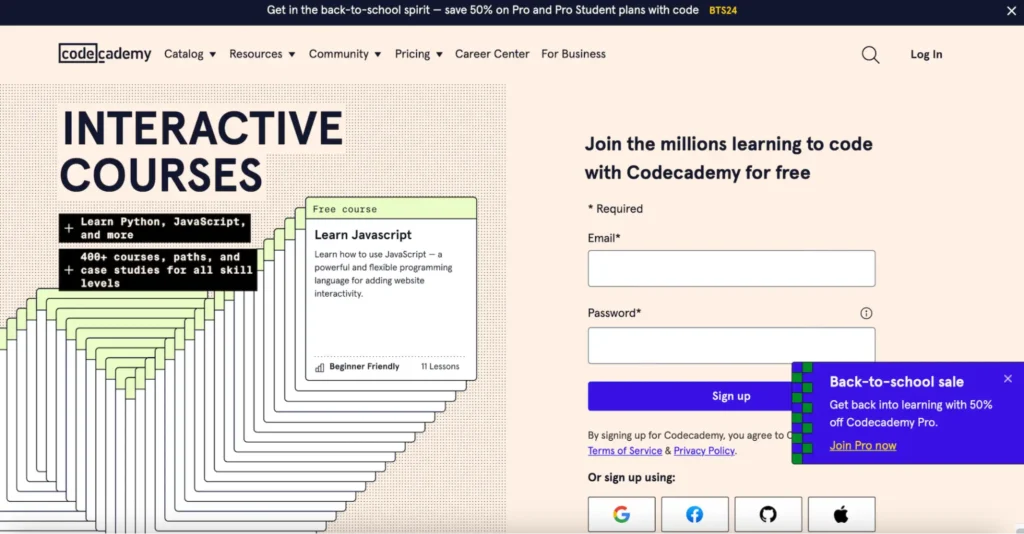
Codecademy is the ideal place to learn about code in a simplified manner, as it offers some of the best online courses.
Features
• Interactive coding environment in your browser
• Instant feedback on your code
• Wide range of programming languages and frameworks
• Structured learning paths for different career goals
• Projects to build your portfolio
Pros
- Hands-on, interactive learning from day one
- Beginner-friendly approach to coding
- Free courses available to try before committing
- Wide variety of programming languages to explore
Cons
- Limited depth in some advanced topics
- Fewer video tutorials compared to some platforms
- Certificates may not carry as much weight as some alternatives
Criteria Evaluation
Course Variety: 3/5 (focused on coding)
Instructor Quality: 4/5
Platform Usability: 5/5
Value for Money: 5/5
Certification Options: 4/5
Community Reviews and Expert Recommendations
Codecademy users obviously have a main focus on code, and most highly recommend this platform. The simple approach to coding is mentioned many times, and the pricing structure.
“I’m currently learning Python, since I am following the data analyst path and it is really nice. I really like the platform, the quizzes that help you remember what you are learning, everything. Of course it is not enough, you have to practise a lot with other projects, but it is a really good start. Theory and practice are nicely mixed together.” – Maria Rubino via Trustpilot
“I am learning a lot on codecademy. The learning experience is fun and reading material is not boring. When you create a project you check off each task with clear instructions. It is a little expensive but if you pay yearly it is great! Highly recommend!” – Jeff Philips via Trustpilot
Industry experts rate Codecademy for its simplified approach to coding and its feedback methods in particular. However, they also believe that these courses won’t be enough for a senior position.
Pricing
Codecademy offers the following pricing options:
• Free basic access to many courses
• Codecademy Pro: $19.99 per month (billed annually) or $39.99 per month (billed monthly)
• Team plans available for businesses
5. HubSpot Academy
Best Known for Free Marketing and Sales Courses
While I had heard of HubSpot, I was unaware of its academy, so I was keen to try it. Overall, it’s a great option for anyone who wants to learn about marketing, sales, and customer service.
The big plus point here is that these online courses are free. There are no extra fees; everythings is available for everyone, at any time. I already had some prior knowledge of digital marketing but I learned a lot with several of these courses. They’re also very practical, so I could put into practice what I learned.
While using the platform, I did see the HubSpot tools featured in the courses. This is a company that sells marketing and sales software, but it’s easy to complete the courses without purchasing this.
I rate HubSpot Academy for the best online course library related to marketing, sales, and customer service. Of course, anyone who wants to learn about another topic won’t find this platform useful.
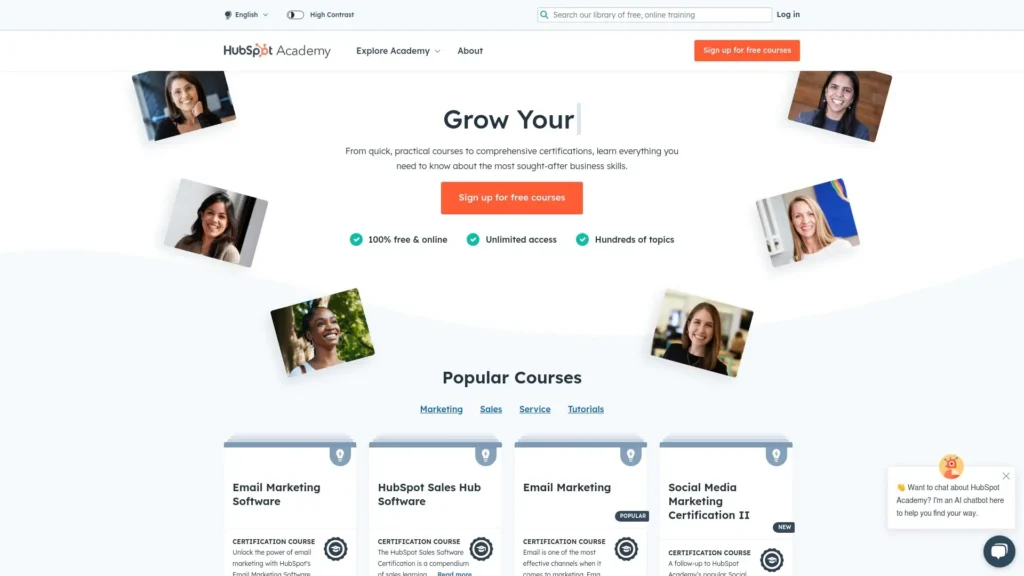
HubSpot Academy features courses about marketing, sales, and customer service and offers some of the top online courses in the sector.
Features
• Completely free courses and certifications
• Industry-recognised credentials
• Practical, up-to-date content
• Self-paced learning
• Mix of video lessons, quizzes, and practical exercises
Pros
- High-quality, free courses in marketing and sales
- Industry-recognised certifications
- Regularly updated content to keep up with industry trends
- Practical, applicable skills taught
Cons
- Limited to marketing, sales, and customer service topics
- Some content may be too focused on HubSpot’s products
- Less interaction with instructors compared to paid platforms
Criteria Evaluation
Course Variety: 3/5 (focused on marketing and sales)
Instructor Quality: 4/5
Platform Usability: 5/5
Value for Money: 5/5 (free)
Certification Options: 4/5
Community Reviews and Expert Recommendations
“I will say I am really enjoying it so far. Looks like they have a lot of courses and the one I’m currently taking is very easily digestible. I’ll definitely be checking out more courses on there.” – Droskalino via Reddit
“Yes, hubspot has a nice collection of courses not only in marketing but other fields too such as sales, web design, inbound service.. and you can also select the level( beginner, intermediate, advanced). However not all courses have a certification.” – Dazzling_Vegetable via Reddit
Industry experts agree that HubSpot’s courses are good quality and offer up-to-date knowledge about a fast-moving field. However, they express some concern about the Hubspot-centric content in some courses.
Pricing
HubSpot Academy’s pricing is straightforward – all courses and certifications are completely free.
6. LinkedIn Learning
Best Known for Professional Development Courses
Who hasn’t heard of LinkedIn? I certainly had, but I didn’t know about the LinkedIn Learning platform until very recently. I’m very glad I discovered it as it has a range of courses that are suitable for many different needs. I found courses on Excel, UX design, and even public speaking. The other plus point is that any course I take gets integrated into my LinkedIn profile, so it looks very impressive to potential employers.
However, not all courses are equal in quality. Some can be less useful than others, but overall, I have enjoyed the courses I’ve taken. It’s also possible to download course content to view offline.
The downside is the pricing structure. The best online courses often work on a subscription model and this is no different. For that reason, I wouldn’t recommend it to anyone who only wants to take one or two specific courses.
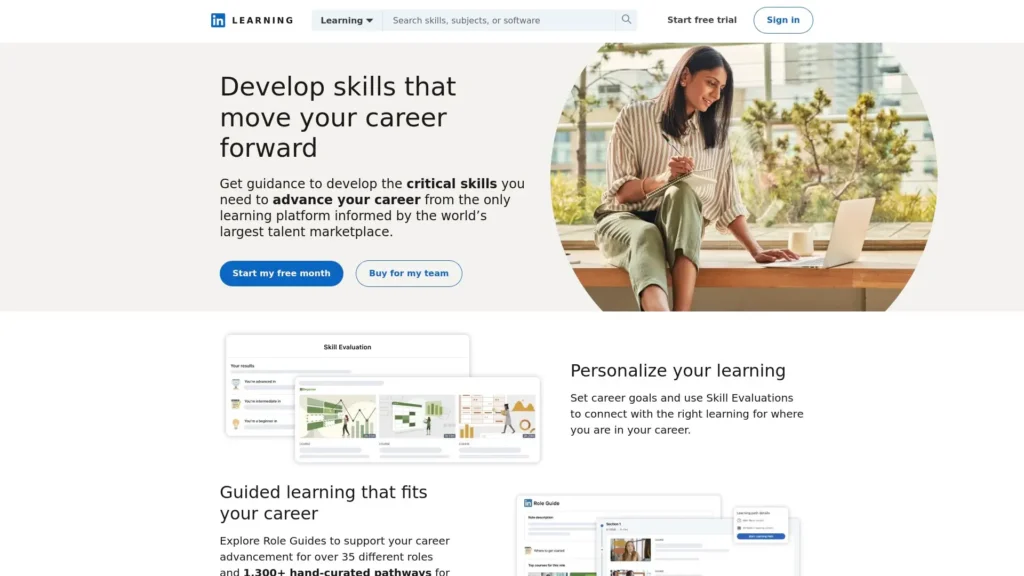
LinkedIn Learning has a range of online courses for all needs.
Features
• Vast library of courses across business, creative, and tech fields
• Integration with LinkedIn profiles
• Personalised course recommendations
• Downloadable courses for offline viewing
• Certificates of completion for your LinkedIn profile
Pros
- Wide range of professional development courses
- Easy integration with LinkedIn profiles
- High-quality video production
- Offline viewing option
Cons
- Subscription model may not suit occasional learners
- Quality of courses can vary
- Less academically focused than university-affiliated platforms
Criteria Evaluation
Course Variety: 5/5
Instructor Quality: 4/5
Platform Usability: 4/5
Value for Money: 4/5
Certification Options: 4/5
Community Reviews and Expert Recommendations
LinkedIn Learning is a very impressive online learning platform and many community users agree. Let’s take a look at some of their comments:
“I’ve done a handful of their courses (for web devs) and they do come off as higher quality (with better production value) than average, and ended up learning quite a bit. It’s worth at least paying for one month to binge as many courses as you can, so you can find out what the courses you’re interested in are like.” – Vite-4117 via Reddit
“I took a few free ones & the content was quite good. I just received another email for one that looks interesting. I find that these Linked-In courses I’ve taken so far are very worthwhile & relevant.” – Control_Illustrious via Reddit
Pricing
LinkedIn Learning offers the following pricing options:
• Monthly subscription: $29.99/month
• Annual subscription: $239.88/year (equivalent to $19.99/month)
• 1-month free trial available
• Some employers and libraries offer free access
7. edX
Best Known for University-Level Courses and Programs
I was very impressed with the range of courses available on edX and their credentials. This online course provider links with some top universities and institutions. I’m talking about places like Harvard, Berkeley, and MIT. I’d highly recommend this platform for anyone who would like to go back to school but doesn’t have the time or means.
These courses are challenging but they’re university level, so it’s unsurprising. In many ways, they’re like mini graduate degrees, and there are many subjects available. I could audit many of the courses without paying, so I could easily find out what I was getting myself into. In this case, the course materials are available but no certificate. From there, I could decide whether to invest or not.

edX offers university-level courses in various subjects, making it among the best online courses.
Features
• Courses from world-renowned universities and institutions
• Options for individual courses, MicroMasters, and full online degrees
• Ability to audit most courses for free
• Verified certificates for completed courses
• Some programs offer credit towards full degrees
Pros
- High-quality, university-level courses
- Option to audit many courses for free
- Verified certificates from prestigious institutions
- Pathway to credit for some programs
Cons
- Some courses can be very challenging
- Limited interaction with professors in most courses
- Full certificates and degrees can be expensive
Criteria Evaluation
Course Variety: 5/5
Instructor Quality: 5/5
Platform Usability: 4/5
Value for Money: 4/5
Certification Options: 5/5
Community Reviews and Expert Recommendations
edX enjoys many positive reviews from users, however there are several average reviews too. Most revolve around pricing and customer service.
“Excellent experience with edX, I audited a course and gained a lot of insight, tools and tips from expert lecturers/professors. Would recommend to anyone serious about professional growth and able to dedicate the time and focus to learning on an online platform. Thank you!” – Shalon via Trustpilot
“I can understand the courses are quite informative, but I think for professional certificates, at least the first modules should be free so learners can try it out and see if they fit the needs. There should also be a provision for discounts or financial aid like those Coursera provides.” – Sam Jacks via Trustpilot
This online course provider enjoys positive feedback from industry experts too. Many praise this platform’s courses and complexities. As such, it’s a great option for anyone who wants to go back to school but struggles with full-time attendance.
Pricing
edX’s pricing varies depending on the course or program:
• Many courses can be audited for free
• Verified certificates for individual courses typically range from $50 to $300
• MicroMasters programs usually cost between $700 to $1,400
• Full online degrees can range from $10,000 to $25,000
8. Udemy
Best Known for its Vast Course Marketplace
The final online learning provider I reviewed was Udemy. This is a name that is very recognisable and I was keen to learn more. The good thing about Udemy is that there is every type of course available, and it doesn’t lean toward any specialisation.
I’ve taken a few Udemy courses and while some are good quality, others are less useful. It’s important to read the course content and reviews before jumping in. While some courses are taught by industry experts, that doesn’t cover the whole library.
The good news is that many online courses are very cheap and have regular sales. However, many Udemy certificates aren’t certified. For that reason, I’d recommend Udemy for anyone who wants to learn new skills and knowledge, and not necessarily for a career route.

Udemy offers a huge range of different courses, which is why it sets among the best online courses on our list.
Features
• Massive selection of courses on almost any topic
• Lifetime access to purchased courses
• Mobile app for learning on-the-go
• Instructor Q&A and discussion forums
• 30-day money-back guarantee
Pros
- Huge variety of courses on countless topics
- Frequent sales and discounts
- Lifetime access to purchased courses
- No subscription required – pay per course
Cons
- Course quality can be inconsistent
- Certificates not accredited or widely recognized
- Limited vetting of instructors
Criteria Evaluation
Course Variety: 5/5
Instructor Quality: 3/5 (varies widely)
Platform Usability: 4/5
Value for Money: 4/5
Certification Options: 3/5
Community Reviews and Expert Recommendations
Udemy enjoys a mixed bag of reviews, however the majority are positive. Many users enjoy the wide range of subjects on offer and the low prices. However, some mention the limited vetting of instructors.
“There are tons of tutorials available online, maybe even more than you’ll ever need. Finding the right one can be tricky, so make sure to filter your search carefully. Don’t forget to preview the sample lessons before buying, as the instructor’s accent can sometimes be a dealbreaker.” – Vedat Erenoglu via Trustpilot
“Recently I was looking for a trustworthy online portal because I wanted to upskill and change my career path. I explored many options on this site, checked with my colleagues and seniors for the value delivered by the Udemy course.. I finally figured that for upskilling, I need to get a degree from a recognised university. These courses are not recognised and don’t hold much value in the real world.” – Ankush Kapoor via Trustpilot
Industry experts concur with user reviews. While they praise the large number of courses available, they question their value in a professional setting. There is also the same question around the professionalism of some course tutors. However, they do appreciate the low prices and rate Udemy for personal development in particular.
Pricing
Udemy’s pricing structure:
• Individual course purchases, typically ranging from $19.99 to $199.99
• Frequent sales often reduce prices to $9.99 – $19.99
• Udemy Business subscription available for teams and organisations
Notable Mentions
Khan Academy
Khan Academy offers free courses in maths, science, and other academic subjects. It is an ideal choice for K-12 and early college students in particular.
Skillshare
Anyone interested in creative skills will enjoy Skillshare. This online course platform operates on a subscription model. It is an ideal choice for writers, designers, and artists.
MasterClass
MasterClass is a comprehensive online learning platform. The unique feature here is that it’s taught by industry leaders and celebrities, rather than tutors. However, it is more for entertainment than to further a career.
Pluralsight
The final online learning platform is Pluralsight, which specialises in tech and IT courses. It is a good choice for IT professionals and developers and many courses have certification.
FAQ
Which online course provider is best for career advancement?
There are many online courses around and choosing the best for career development depends on the subject niche. Udacity and Codecadmy are the best options for tech and coding respectively. However, for marketing and customer service, HubSpot Academy is a solid choice. LinkedIn Learning is ideal for many professional skills. By examining your career aims first, it’s easier to make a solid choice.
Are online course certificates recognized by employers?
Not all online course providers offer certified courses and even if they do, they may not be recognised by every employer. For that reason, research is vital. Coursera, Udacity, and edX often carry a lot of weight, and HubSpot certifications are also well-regarded.
How much do online courses typically cost?
Online courses vary in price based on platform, subject and level. For instance, Udacity’s Nanodegree courses are very expensive, yet Coursera and Udemy courses can often be found for a lower cost. Shopping around is important here, and setting a budget.
How long does it typically take to complete an online course?
The time taken to complete an online course depends on the subject and the complexity level. Some courses are degree level, which will take several years to complete. However, Udemy’s courses can sometimes take weeks or hours. Many of these courses are self-paced, so it’s easier to fit them into a daily lifestyle.
Can I get a refund if I’m not satisfied with an online course?
Refunds vary from platform to platform. It’s important to read the terms and conditions before making a purchase, just in case. However, most reputable platforms have a refund policy of some kind. Udemy offers a 30 day money back guarantee and Coursera gives 14 days to request a refund after payment.
Many platforms also enable customers to preview online course content before making a purchasing decision.
Final Thoughts
It’s never a bad decision to learn something new, whether it’s for a career or simply for personal development. There are many online course providers and the ones I’ve reviewed are some of the best. It’s important to carefully assess your aims before making a decision. For instance, anyone interested in code should certainly look toward Codecademy. Just like anyone wanting to improve their tech career prospects should look at Udacity. Shopping around will always yield the best results.
Having studied many online courses myself, I know how beneficial they can be. Not only are they useful for careers, but they boost confidence and skills too.
However, it’s just as important to stay safe while studying online.
Here at Privacy Australia, we’re committed to helping everyone have a secure experience. We have a range of resources to understand online security, including using VPNs. We also have many roundups where we dive into specific industry courses, including:
- Best Social Media Marketing Courses
- Best Coding Courses
- Best Web Development Courses
- Best Online IT & Software Courses
- Best Machine Learning Courses
- Best Free Online Courses
- Best Data Science Courses
- Best Cybersecurity Courses
- Best Stock Trading Courses
In the end, you’ll be full of new knowledge and skills, and stay safe and secure at the same time.
You Might Also Like:



